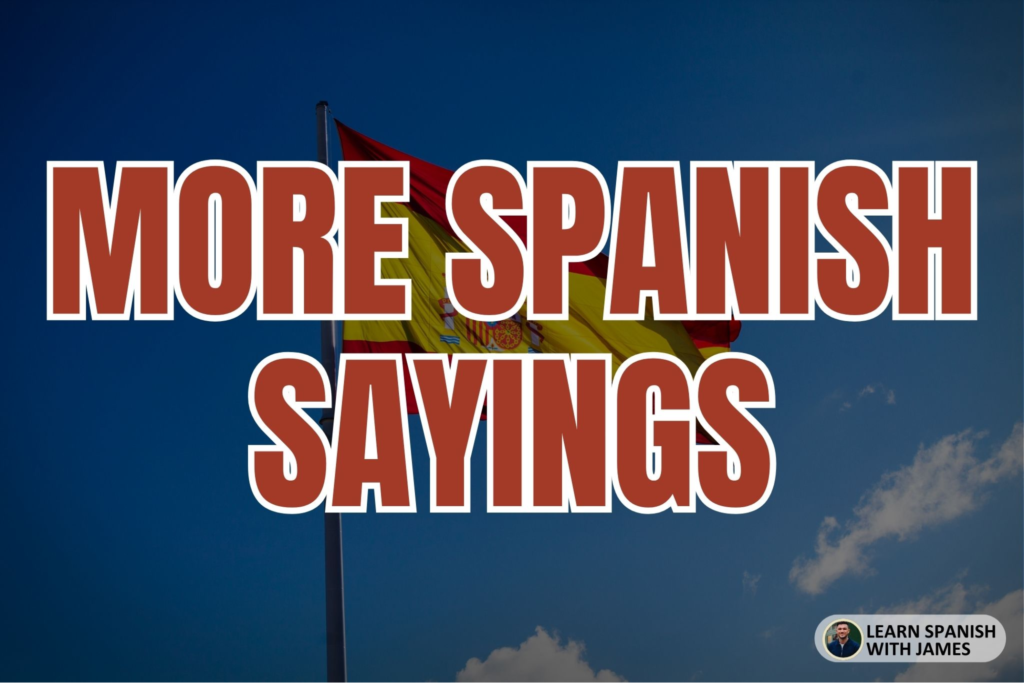75 Funny Spanish Idioms to Learn ASAP!

Learning a language involves more than just grammar and vocabulary; it’s about understanding the cultural nuances that make communication vibrant and lively.
And mastering idioms is crucial for achieving native-like fluency in any language. Spanish is no different in this regard.
Spanish boasts a vast array of idiomatic expressions, with some being widely recognized across the Spanish-speaking world. Others remain exclusive to certain regions or even individual countries.
I’m James, from Learn Spanish With James, a site dedicated to helping you learn Spanish through free online resources.
In this post, I’ve gathered 75 funny common Spanish language idioms that will tickle your funny bone (is that an expression?)
These funny Spanish idioms will also deepen your understanding of the language and culture of Spain and Latin America.
I’ve split these expressions out by country, so that you can learn specific Spanish idioms for wherever you’re heading to next.
Let’s dive in!
What is Special About Idioms?

Spanish idioms are expressions or phrases with figurative meanings that often defy literal interpretation or exhibit some sort of grammatical peculiarity.
For instance, consider the English idiom “to hit the hay.”
I’ve always liked this expression. After all, this doesn’t actually imply physically striking hay!
Instead, it means going to bed or sleeping.
While this phrase might confuse someone unfamiliar with English idioms, most native speakers understand its figurative sense.
Similarly, Spanish possesses its own set of unique idioms.
Attempting to translate an English idiomatic expression directly into Spanish, such as “to hit the hay,” would result in loss of meaning.
Spanish speakers use entirely different phrases, like “irse a dormir” or “meterse a la cama,” to convey the same idea.
The Difference Between Literal and Figurative Meanings

As I already explained, one of the intriguing aspects of language learning and idiomatic expressions is the stark contrast between their literal and figurative meanings.
While the literal translation might seem nonsensical, the figurative meaning usually conveys a clear message or sentiment.
Understanding this distinction is essential for grasping the true essence of Spanish idioms.
Now, let’s delve into the world of idiomatic Spanish expressions, categorized by country.
Spanish Idioms (from Spain)

- Estar como una cabra – (To be like a goat) – This Spanish idiom means ”to be crazy or eccentric.”
- Tomar el pelo – (To take the hair) – The literal translation of ”tomar el pelo” is “to take the hair” but the actual meaning is similar to the English idiom ”to pull someone’s leg” or tease them.
- Tirar la casa por la ventana – (To throw the house out of the window) – One of the idiomatic phrases that means ”to spare no expense” or go all out for a celebration.
- Dar la vuelta a la tortilla – (To flip the omelet) – The figurative meaning of ‘‘dar la vuelta a la tortilla” is ”to turn the situation around.”
- Ser pan comido – (To be eaten bread) – This is also one of the most common Spanish idioms and it means ”to be a piece of cake” or very easy.
- Se me hace agua la boca – (My mouth waters) – A popular Spanish idiom meaning that something looks or sounds delicious.
- Entre la espada y la pared – (“Between the sword and the wall”) – This idiom is literally translated as ”Between the sword and the wall ” but its English equivalent would be ”Between a rock and a hard place”.
- Tener un humor de perros – (To have a dog’s humor) – Those who speak Spanish use this phrase to say ”to be in a bad mood.”
- Buscar al príncipe azul – (To look for the blue prince.) – This Spanish idiom refers to royalty having blue blood, and it means looking for Prince Charming or a knight in shining armor.
- Encontrar tu media naranja– (To find your half orange) – The literal meaning of this idiom is ”to find your half orange” but Spanish speakers use the phrase to say ”to find your other half” or ”find true love.”
Mexican Spanish Idioms

- Ni modo – (There is no other way; Oh well) – Acceptance of a situation or resignation to an undesirable outcome.
- No le eches crema a tus tacos – (Don’t exaggerate) – Advising someone not to overdo or embellish a situation.
- ¡Ya salió el peine! – (It’s clear now!) – The truth has been revealed or a hidden agenda has been exposed.
- Hablando del rey de Roma – (Speak of the devil) – Meaning: Coincidentally mentioning someone who then appears.
- La neta – (Honestly) – Expression of sincerity or truthfulness in speech.
- Estar hasta atrás – (To be very drunk) – Being heavily intoxicated or inebriated.
Argentinian Spanish Idioms

- Ser una rata – (To be a rat) – To be stingy or cheap.
- Estar al pedo – (To be at the fart) – To have nothing to do or be idle.
- Estar en las nubes – (To be in the clouds) – To be absent-minded or daydreaming.
- Tener la negra – (To have the black one) – To have bad luck.
- Qué quilombo – (What a brothel) – What a mess!
Costa Rican Spanish Idioms

- Aguevado – (Bored or boring) – Feeling bored or causing boredom.
- Brete – (Work or job) – Employment or a task that requires effort.
- Chunche – (Thingamajig) – An unspecified object or item.
- Como amaneció? – (How are you this morning?) – A greeting asking about someone’s well-being in the morning.
- Dolor de jupa – (A headache) – Pain or discomfort in the head.
- Estar de chicha – (To be angry) – To be in a state of anger or irritation.
- Estar de goma – (To have a hangover) – To experience the aftereffects of excessive alcohol consumption.
- Güila – (A girl) – A female, despite its different meaning in other Spanish-speaking regions.
- Jamar – (To eat) – To consume food.
- Jumas – (Drunk) – Intoxicated from alcohol consumption.
Colombian Spanish Idioms

- La vuelta se cayó – (The turn fell) – Something didn’t turn out as planned.
- Echar carreta – (To talk for a long time) – Engaging in informal conversation or hanging out.
- Mamar gallo – (To bother) – Teasing or deceiving someone.
- Poner los cachos – (To cheat on) – Infidelity in a romantic relationship.
- No des papaya – (Don’t give papaya) – Don’t expose yourself to danger or risk by being careless.
- Hágame un cruce – (Do me a crossing) – Ask for a favor.
- Estar jincho – (To be drunk) – Being intoxicated from alcohol.
- Enguayabado – (To be hungover) – Experiencing the aftereffects of excessive alcohol consumption.
- Estar en la olla – (To be in the pot) – Being in a difficult or undesirable situation, especially economically.
- Puyar el burro – (To hurry up) – Meaning: Urging someone to move quickly or hasten their actions.
Venezuelan Spanish Idioms

- “Aunque la mona se vista, mona se queda.” – (Even though the monkey dresses up, she’s still a monkey.) – Humorously conveys that true nature cannot be concealed despite appearances.
- “La hora del burro.” – (The hour of the donkey.) – The post-lunch sluggishness or lethargy.
- “Te dejaron como novia de pueblo, vestida y alborotada.” – (You were left like a small town bride, dressed and excited.) – Describes being stood up or shunned last minute after making an effort.
- “Boca de sapo.” – (A toad’s mouth.) – Refers to someone who talks too much and can’t keep secrets.
- “Sudar la gota fría.” – (Sweat the cold drop.) – Working hard and giving one’s all on something.
- “Por la plata baila el mono.” – (The monkey dances for money.) – People will do anything for money.
- “Más peligroso que mono con hojilla.” – (More dangerous than a monkey with a razor blade.) – Something extremely dangerous.
- “Más jodido que surfista en Bolivia.” – (More screwed than a surfer in Bolivia.) – To be in a very difficult situation.
- “Eres una piña bajo el brazo.” – (You’re a pineapple under the arm.) – Refers to someone who is a terrible nuisance or bore.
- “Vas pa’l cielo y vas llorando.” – (You’re going to heaven crying.) – Used when someone complains despite having a wonderful opportunity.
More Spanish Sayings

Spanish sayings, or refranes, are colorful expressions deeply ingrained in the language and culture.
Let’s delve into some popular ones and uncover their meanings:
- Al mal tiempo, buena cara – When faced with adversity, maintain a positive outlook. This saying emphasizes the power of optimism in overcoming challenges.
- Más vale pájaro en mano, que ciento volando – It’s better to have something tangible now than to chase after elusive promises. This highlights the value of contentment and practicality over greed.
- Más vale tarde que nunca – Better late than never. Whether it’s a delayed task or a tardy arrival, this saying offers solace in the completion of an action, albeit delayed.
- Ojos que no ven, corazón que no siente – What you don’t see can’t hurt you. This saying suggests that ignorance can sometimes be bliss, sparing us from emotional pain.
- Al que madruga, Dios le ayuda – God helps those who rise early. Encouraging punctuality and diligence, this saying underscores the benefits of early effort.
- A caballo regalado, no le mires el diente – Don’t look a gift horse in the mouth. Gratitude is the essence here, urging us to appreciate gifts without scrutinizing their value.
- Cada maestrillo tiene su librillo – Every master has their own method. Acknowledging diversity in approaches, this saying celebrates individuality and personal strategies.
- En boca cerrada no entran moscas – Silence prevents trouble. Advocating discretion, this saying urges caution in speech to avoid unwanted consequences.
- Vísteme despacio que tengo prisas – Dress me slowly, I’m in a hurry. Paradoxical yet profound, this saying advises against hasty actions, advocating patience for better outcomes.
- Nunca te acostarás sin saber una cosa más – You’ll never go to bed without learning something new. Embracing the pursuit of knowledge, this saying celebrates the continuous journey of learning.
- No hay dos sin tres – There is no two without three. If something happens once, it could be a one-time thing. If it happens twice, it will most likely happen again.
- Nuevo rey, nueva ley – New king, new law. It refers to a person who holds different ideals and therefore is going to run things differently.
- Más vale maña que fuerza – Better skill than strength. Intelligence is better than physical strength.
- Si te caes siete veces, levántate ocho – If you fall seven times, then get up eight – Never stop trying. If you fall, just get up again. What doesn’t kill you, makes you stronger.
- Favor con favor se paga – Favor with favor, it pays. You do a favor for me, and I’ll do a favor for you.
- Dar gato por liebre – To give cat for hare. To provide something of a lower quality than promised.
- El que tiene boca se equivoca – The person who has a mouth makes mistakes. Everyone makes mistakes.
- Gastar saliva – To spend saliva. To say something that will be ignored or have no effect.
- Hacer la vista gorda – To do the fat view. To pretend not to notice.
- Cada loco con su tema – Every crazy person with their issue. Everyone has their own way of doing things.
- A falta de pan, buenas son las tortas – In the absence of bread, cakes are good. When faced with limited options, make the best of what you have.
- Dios los cría y ellos se juntan – God raises them and they gather together. People with similar characteristics or behavior tend to gravitate towards each other.
- Dime con quién andas y te diré quién eres – Tell me who you hang out with and I’ll tell you who you are. Your associations reflect your character and values.
- Más se consigue lamiendo que mordiendo – More is achieved by licking than by biting. Diplomacy and cooperation are more effective than aggression.
- ¡Zapatero, a sus zapatos! – Shoemaker, to his shoes. People should stick to what they know.
Incorporating Spanish Idioms into Your Conversations

Now that you’ve familiarized yourself with some hilarious Spanish idioms, it’s time to incorporate them into your conversations.
So, after learning Spanish idioms, here are also a few tips to help you use them appropriately:
Context is Key
The key lies in practicing them within appropriate contexts and understanding the cultural contexts from which they originate.
Practice Makes Perfect
Try using some of these common Spanish idioms in everyday conversations or writing exercises to become more comfortable with them.
Interact with native Spanish speakers through online platforms or language exchange programs to hone your skills.
Learn Spanish idioms from podcasts and videos with subtitles
Begin by watching Spanish movies or TV shows with English subtitles. This will allow you to correlate the idiomatic phrases with their meaning in real-time.
Once you feel you’ve gotten the hang of it, try turning off the subtitles. This will force you to rely solely on your understanding of the language.
Listening to Spanish podcasts can be another effective way. Start with slower-paced shows and gradually move to faster ones as you get comfortable. Rewatching or relistening will reinforce your learning. Each time, you’re likely to pick up new idioms or better understand ones you’ve heard before.
Tailor Idioms to Occasions
Familiarize yourself with idioms suited for specific events or holidays, injecting cultural nuances into your dialogue.
For instance, during Christmas celebrations in Venezuela, you might hear idioms like “estar más claro que la luna” (to be as clear as the moon), reflecting the festive atmosphere and cultural references.
Solidify Your Basic Spanish
Ensure proficiency in fundamental Spanish phrases, providing a strong foundation for seamlessly weaving idioms into discussions.
Mastering basic greetings, expressions, and vocabulary not only enhances your ability to understand idiomatic expressions but also facilitates smoother communication in general conversations.
Explore Regional Variations
It’s essential to acknowledge that Spanish idioms do vary from one region to another. If you have a specific focus, prioritize learning idioms commonly used in that area.
For example, in Colombian Spanish, you might encounter the idiom “estar en la olla” (to be in the pot), which may not be as commonly used in other Spanish-speaking regions.
Following these guidelines will not only expand your vocabulary but also bring you closer to mastering conversational Spanish with flair.
FAQs Relating to the Most Popular Spanish Idioms
Here, I provide answers to some common questions relating to Spanish idioms and the literal meaning of certain expressions.
What is an example of a Spanish idiom?
An example of a Spanish idiom is “No tener pelos en la lengua,” which translates to “To not have hairs on the tongue” in English. It means to speak bluntly or say exactly what one thinks.
Which idioms exist only in the Spanish language?
Many idioms are unique to the Spanish language, reflecting the culture and traditions of Spanish-speaking countries. Examples include “Ser pan comido” (To be eaten bread) and “Estar en la edad del pavo” (To be in the age of the turkey).
Why should I learn Spanish Idioms?
Learning Spanish idioms not only enhances your language skills but also provides insight into Spanish culture and mindset. It enables you to speak Spanish more fluently and understand native speakers better in everyday conversations.
What is a popular phrase from a Latin American Spanish-speaking country?
A popular phrase from a Latin American Spanish-speaking country is “Más vale pájaro en mano, que cien volando” (A bird in the hand is worth more than a hundred flying). This phrase, rooted in Spanish culture, emphasizes the importance of valuing what one has in the present over uncertain future possibilities.
Summing Up: Funny Spanish Idioms to Learn ASAP
So, there we have it; over 75 common Spanish sayings and expressions to learn, depending on where you plan to visit next.
Spanish idioms are a great way to become familiar with the language and connect with locals in a way that is more engaging than just usual chitchat.
I hope you’ve found this useful. Share the post if you have! It would mean a lot.
Good luck with your learning!

About James – Or Should that be Santiago?
My name is James. I am a Brit with a love for the Spanish language. I have lived in Spain, Argentina, and Costa Rica, and I have been teaching Spanish for over a decade. This site will show you how to master the elements of Spanish grammar that often dishearten learners. I hope you enjoy the site and find it useful.
If you are interested in taking your Spanish to the next level, check out the Courses section for a full list of the Spanish courses I suggest. All reviews are based on my personal opinions.





